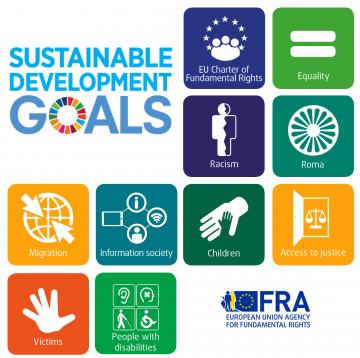Rising inequalities and harassment as fundamental rights protection falters

“Fundamental rights alarm bells are ringing across the EU as inequalities, harassment and prejudices continue to grow,” says FRA Director Michael O’Flaherty. “We need robust responses outlining how rights benefit us all and provide the answers to the inequalities that are holding us back from a fair and just society where everyone can prosper.”
This year’s Fundamental Rights Report reflects on the developments and shortfalls of human rights protection in the EU over the past year. Ratification of the UN’s Disability Convention (CRPD) by 2018 of all EU Member States and the EU’s provisional agreement on the proposed European Accessibility Act were notable important milestones. Globally, the Agenda 2030 and its 17 Sustainable Development Goals outline a blueprint for a better world of equality, justice, and peace. But to succeed, human rights need to be embedded within them as the report outlines in its focus section.
Other key issues identified include:
- Racial discrimination and harassment remain commonplace throughout the European Union. Recognising this, EU institutions adopted measures to counter antisemitism and to tackle racism towards Afro-Europeans. People because of their skin colour, religious belief or ethnicity continue to face widespread harassment, discrimination, entrenched prejudice and discriminatory ethnic profiling across the EU, as FRA’s surveys show. For example, 1 in 5 black people and nearly 3 in 10 Jews experience harassment. All EU Member States should therefore develop national action plans to fight racism and racial discrimination. They should also take a tougher stance against hate crime and hate speech through effective recording, investigating, prosecuting and trying alleged incidents.
- Refugee integration progressed despite diverse hurdles. However, almost 4 in 10 Europeans consider migration as problematic and almost half overestimate the size of irregular migration. Also allegations of migrants including children being push backed, sometimes violently, across the EU’s external border and police mistreatment persist. Such actions underline the urgent need for Member States to act now to stop such abuse, and to ensure asylum and return procedures respect EU asylum law and people’s human rights.
- Child poverty rates in the EU improved slightly but still 1 in 4 children are at risk of poverty. This means that, in one of the richest regions of the world, there are children who go to bed hungry and live in poor conditions with their health and education suffering. For children with foreign parents, it is as high as 4 in 10. Children from an ethnic minority continue to be marginalised. For example, 15% of Roma children experience segregated education. The EU and its Member States should therefore ring-fence funding for measures to reduce child poverty. They should also enhance efforts to address discrimination of minority children to boost social inclusion and their integration.
The report summarises and analyses major human rights developments in the EU over 2018. It contains proposals for action covering the EU’s Fundamental Rights Charter and its use by Member States; equality and non-discrimination; racism, xenophobia and related intolerance; Roma integration; asylum, borders and migration; information society, privacy and data protection; child rights; access to justice; and implementing the UN’s disability convention.
For more please contact: media@fra.europa.eu / Tel.: +43 1 580 30 642